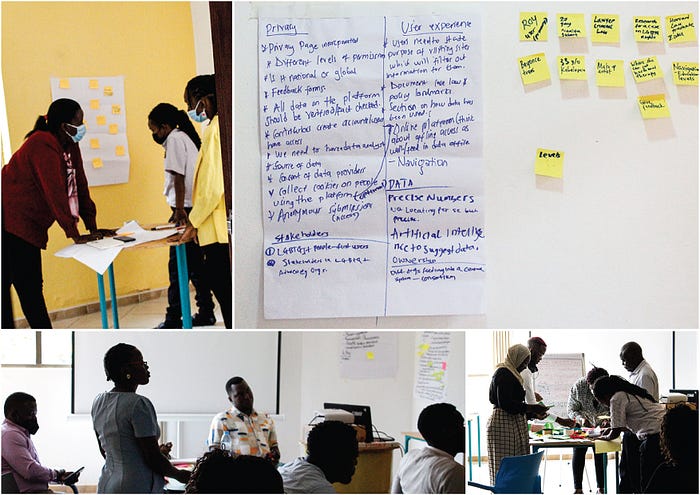Ideating Towards a Data Collaborative Tool for the Marginalized Communities

On the 17th of February 2022 Pollicy in conjunction with Tranz Network Uganda, Freedom and Roam Uganda, Icebreakers Uganda and a select group of experts and representatives from the sexual and gender minorities’ sphere including individuals from the Ministry of Health and other implementing partners working on LGBTQI issues convened in an ideation workshop that’s part of the project Rapid Research for Agile Policymaking supported through the Voice innovative grant facility, an initiative of and financed by the Dutch Ministry of Foreign Affairs as part of their overall policy framework ‘Dialogue and Dissent’ (future Power of Voices) and is executed by a consortium of Oxfam Novib and Hivos.
Workshop Aims and Facilitators
The aim of the workshop was to facilitate a brainstorming of the development of an LGBTQI data collaborative platform which is envisioned to enable key population communities and advocates in coming up with data-driven reports and advocacy campaigns. The physical workshop took the form of short educational and interactive sessions discussing data collaborative tools and the Human-Centered Design and more predominantly practical group ideation sessions by the participants all led by the facilitators Helda Mary Akongo and Silas Byakutaaga.
I must say the facilitators were greatly befitting given their expertise and competencies in regards to the workshop. Mary is a service designer who is passionate about using human-centred design and technology to solve challenges faced by underserved communities.
Silas on the other hand is a designer as well who is very passionate about sustainable design. He is an entrepreneur as well and currently works as Product Development Manager at MoTIV Uganda.
Mapping the Landscape
After a brief introduction of the day’s workshop by the facilitators, a mapping done by Pollicy and presented by Bonaventure Saturday, a Researcher at Pollicy, named particular issues as a preamble laying out the need for the workshop. Key issues of significance pointed out included data security issues amongst others:
- Lack of practical data skills
- Inaccurate or incomplete data
- Sensitivity of the data collected and potential misuse
- Cost of storing data
- Unwilling to collaborate and share data
What is Human-Centred Design?
Thereafter, the facilitators led an educative session explaining the Human Centred Design (HCD) approach that was to guide the ideation process of developing the data collaboration tool. The term HCD is one that may not be so familiar to a number of people despite its functionality being pretty easy to grasp. Generally speaking, the HCD refers to a design paradigm that seeks to involve people in every step of the problem-solving process also called “co-creation”. The HCD process typically flows from the step of inspiration where the user’s needs are researched to the ideation phase which is followed by prototyping whereby, we start to create solutions, and finally the testing or implementation phase where the solutions are then tried out.
From the various group activities we were tasked with, it became clear as was constantly reiterated by the facilitators that the HCD is an iterative process that goes on and on and as such can take long periods of time when developing anything with it. This is because it seeks to be exhaustive in understanding the point of view of the user experience and considers a multivariate of perspectives. As such, its advantages over other design approaches as pointed out during the workshop consist of sustainability, ownership, saving of funds, inclusivity as well as helping in learning and iterating faster among other reasons.

Important to add though is how fun the process can be! A great illustration was the “create a wallet for your pairmate” exercise which required one understands the likes, preferences, and needs of the other. This was enlivening and saw participants evoke giggles and put smiles on others’ faces with the wallets they made for each other.
Building a Data Collaboration Platform
Following the exercise, data collaboration tools were explained to participants and they were provided with basic definitions that could help guide their ideation process. A data collaboration platform was defined as; “a centralized repository where users can draw in information, knowledge, and insights.” A quick brainstorm by participants identified common ones including the internet, Google Drive, and many others and their different pros and cons. Finally, participants still identified the need for such a tool with specificity to the needs of the LGBTQI persons and advocates.
Afterwards, participants broke out into groups to ideate and come up with concepts of potential data collaboration platforms guided by the important questions we were told needed to be answered. Among these included key concerns such as what the purpose of a data collaborative tool would be, what information should be on it, how it shall be accessed and how it can be kept secure. This went on for most of the day under elaborate guidance from the facilitators. As the workshop nearly came to an end, each group shared their very diverse, inspiring and insightful ideas with the other groups and it was here that the power of the HCD was witnessed with different groups striving to deeply understand their user’s reality and needs and finally coming up with a model that best fits them.
Closing and Next Steps
The workshop was then closed off with remarks from Gilbert Beyamba, Programs Director at Pollicy together with the facilitators. Here, participants were applauded for their tireless efforts and their feedback was collected on a number of issues particularly concerning how to best proceed with the development of the tool to ensure its maximum effectiveness.
